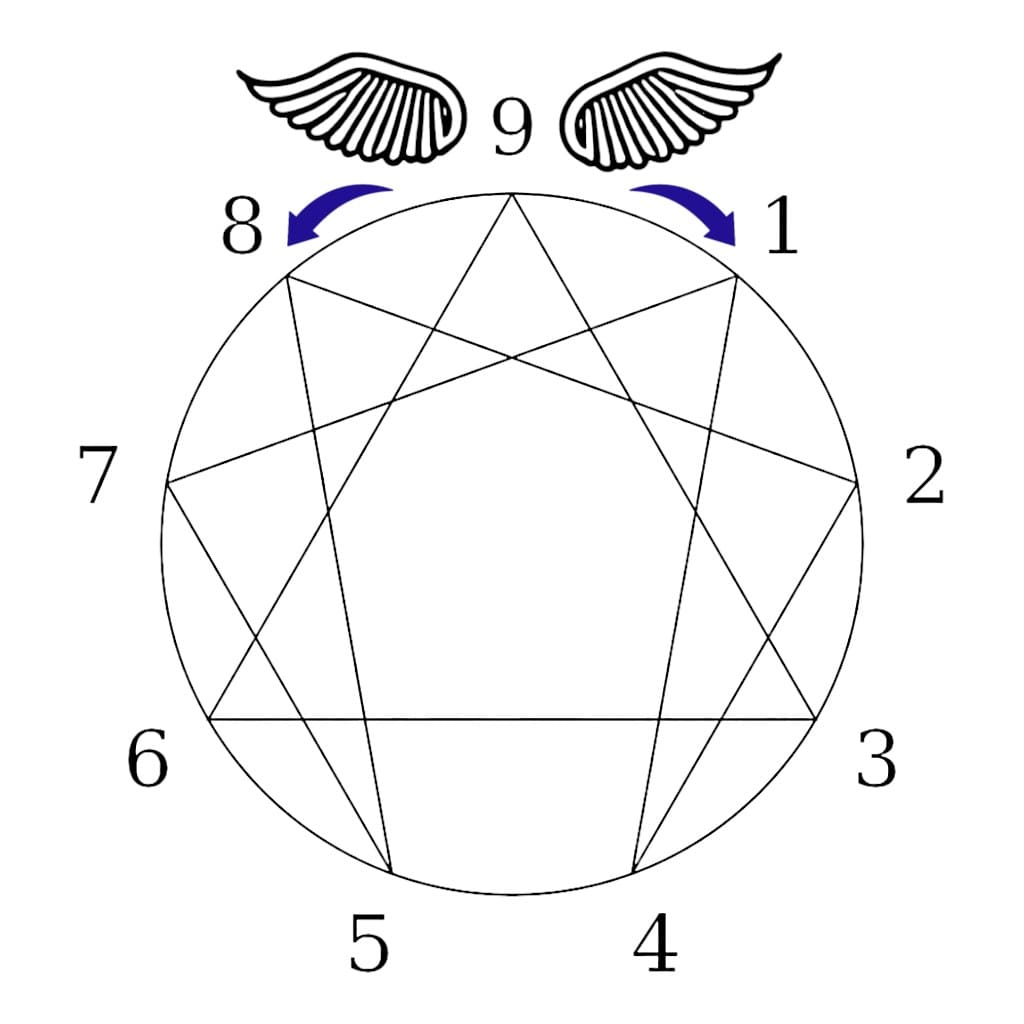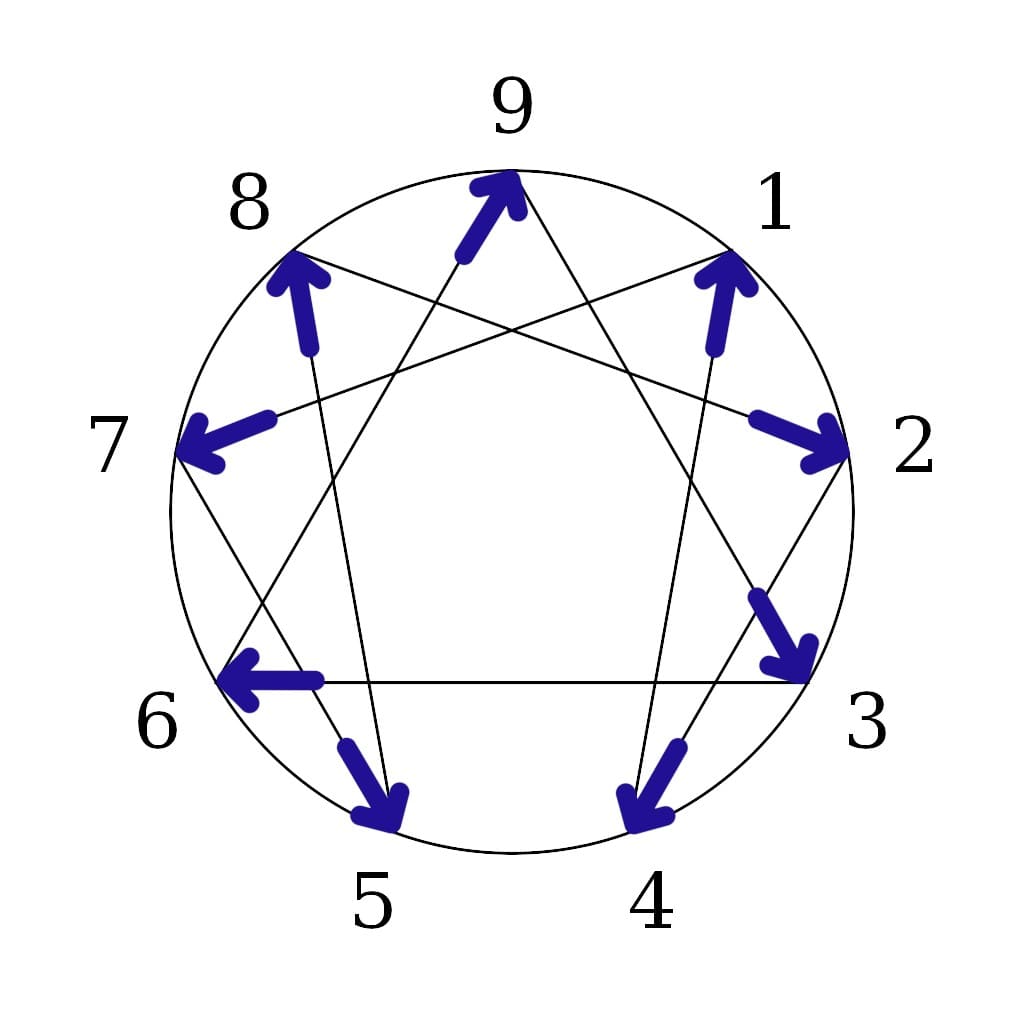Understanding the Basics of the Enneagram
What defines an enneagram type?
An enneagram type is not defined by common personality traits (kind, helpful, intellectual, etc.), but primarily by what is called its "avoidance compulsion." The avoidance compulsion is not always easy to identify as it often influences us unconsciously. It represents the core of an enneagram type, and from this compulsion, many other characteristics are derived (though these become more open to interpretation).
The goal of the enneagram is to help us become more aware of how this "avoidance compulsion" influences us, to better understand ourselves, and to learn to manage it, aiming to become better individuals.
What are the 9 enneagram types?
Type 1: The Perfectionists
Perfectionists avoid internal anger at all costs. Guided by morality and ethics, they have a critical voice in their heads. They strive to avoid mistakes that could question their competence and trustworthiness. Read more about enneagram type 1.
Type 2: The Helpers
Helpers avoid acknowledging their own needs. They prefer giving over receiving and do everything to be loved by the important people in their lives, avoiding disappointment. Read more about enneagram type 2.
Type 3: The Chameleons
Chameleons avoid failure. They do everything to avoid unproductivity, inactivity, mediocrity, and a poor appearance. Read more about enneagram type 3.
Type 4: The Dreamers
Dreamers avoid banality. They strive to avoid feeling rejected, insignificant, misunderstood, and inauthentic. Read more about enneagram type 4.
Type 5: The Investigators
Investigators avoid inner emptiness by continually seeking knowledge. They strive to avoid strong feelings (especially fear), intrusive people, and action without sufficient thought. Read more about enneagram type 5.
Type 6: The Loyalists
Loyalists avoid deviance. They strive to avoid ambiguity in ideas, relationships, roles, and situations, and question anything unproven. Read more about enneagram type 6.
Type 7: The Adventurers
Adventurers avoid inner suffering. They do everything to avoid sadness, emotional pain, frustration, limitations, constraints, and boredom. Read more about enneagram type 7.
Type 8: The Leaders
Leaders avoid weaknesses. They strive to avoid being weak, vulnerable, dependent on others, unjust rules, and being controlled or manipulated. Read more about enneagram type 8.
Type 9: The Peacemakers
Peacemakers avoid conflicts. They strive to avoid confrontations, expressing too many demands, and losing their peace of mind. Read more about enneagram type 9.
What is an enneagram type wing?

The wings of type 9
Each enneagram type has two predetermined wings. The wings of an enneagram type correspond to its previous type and the following type. For example, the wings of enneagram type 3 are types 2 and 4. And the wings of type 9 are types 8 and 1 (since there is no type 10).
A person's enneagram wing is the wing (among the two possibilities based on their main enneagram type) that has the most influence on their personality. So if someone is described as a "3 wing 2", it means that type 2 has more influence on their main type than type 4. Therefore, they are probably more helpful (a personality trait often associated with type 2) than a person with a type 3 wing 4.
The wing adds a bit of nuance to a person's enneagram description. However, its influence remains very minor compared to what the main enneagram type represents. For example, if someone is said to be a type 3 wing 4, it means that this person is type 3, with a stronger influence from type 4 than from type 2. But it is the type 3 that primarily defines them. The wing only adds a small nuance, which is minor compared to what the main type brings to their description. The wing is not to be considered with the same importance as the main type, especially since it is the main type that defines our avoidance compulsion (which we should learn to manage better). Therefore, it contributes the most to personal development.
Can a person have multiple enneagram types?
For most people, no, and that's a good thing. Because fundamentally, an enneagram type is not a personality type but rather a compulsive circle. And trying to master even one is not easy, let alone several... If this were to happen, it would probably be in a prolonged "unhealthy" stage, during which compulsions from other types could be added to the base type. However, one can certainly have personality traits from multiple enneagram types, and this is very often the case! We are all capable of developing all the personality traits of all types without belonging to those types. Especially when we are "healthy," and more in control and in harmony with ourselves. Thus, a type 9 person can be as generous as a type 2 person. And type 3 individuals can be as intellectual as type 5 individuals. What differentiates them primarily is their avoidance compulsion.
Can my enneagram type change over time?
It's rare, but it's possible. Depending on your environment, new strong external influences, and your choices, you may become more sensitive to a new avoidance compulsion and move closer to another enneagram type.
What are the integration and disintegration types?

The integration types (blue arrows)
The integration and disintegration types are two enneagram types a person tends to move towards based on their relationship with the avoidance compulsion defining their enneagram type. When a person is in a good relationship with their compulsion (handling it well), they move towards their integration type. Conversely, when a person is in a bad relationship with their compulsion (not handling it well and falling under its influence), they move towards their disintegration type. These types are predetermined based on the base type. For example, the integration type for type 8 is type 2, and its disintegration type is type 5. People of the same enneagram type can be very different depending on their mental state ("healthy," "unhealthy," or "average").
When you become healthier, you develop a connection with a broader range of positive personality traits (and any base type assumes that it can develop those generally attributed to any other type). But the integration type is generally quite opposite to the base type, thus confirming a person's real improvement.
As for the disintegration types, they highlight the negative traits that the base type would generally naturally avoid manifesting. So if they come to manifest them, it directly indicates their inner distress and mental state ("unhealthy").
What is a "healthy" or "unhealthy" type?
A person is considered "healthy," "average," or "unhealthy" based on how well they manage their compulsion. If they are mentally healthy towards themselves and others, or not. Thus, two people of the same enneagram type can be very different, depending on whether they handle their avoidance compulsion well or not. This is why there is the category "in harmony" and "out of balance" in the description of each enneagram type on this website. In which people can find themselves depending on the moments they go through, and more or less frequently. According to circumstances, their way of managing things and themselves, etc. So when most of the time a person is "in harmony," they are considered "healthy." Conversely, if they are most of the time "out of balance," then they are considered "unhealthy." And finally, if it's more in between, they are considered "average."
What is the best enneagram test?
It is very important when discovering the enneagram to keep in mind that the enneagram is not a test but a theory. An enneagram test aims to help you find your type, but you are the best person to determine your type. Therefore, it is very important when taking an enneagram test to ensure you take a good quality test, to avoid being misled and missing out on the potential of the enneagram.
This enneagram test was initially designed to be as reliable as possible and to allow more people to discover their enneagram type. A good enneagram test requires, in addition to a good choice of questions, a serious post-analysis of the answers, to optimize its algorithm and provide the most reliable results possible. This was done at the launch with the very first online version of this test (in 2018).
Moreover, the algorithm of this test has been refined over the years with more than 1,400,000 results and thousands of user feedbacks. This makes us confident that today, in terms of reliability, this website has the best enneagram test available on the internet.
How long does the test take?
This enneagram test consists of 72 questions and takes about 10 minutes.
Is this enneagram test free?
Yes. This is a free enneagram test. After taking the test, you can access your results instantly for free.
What do the free enneagram test results include?
The free enneagram test results include your main enneagram type, your wings, the test analysis, your score for each enneagram type, and a complete description of your enneagram type.